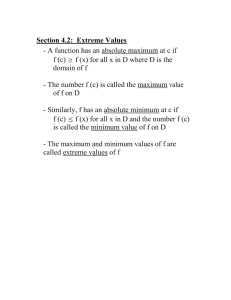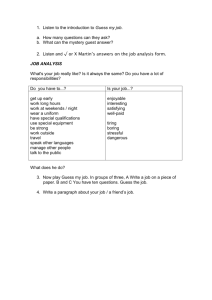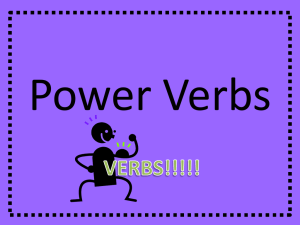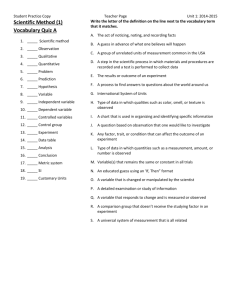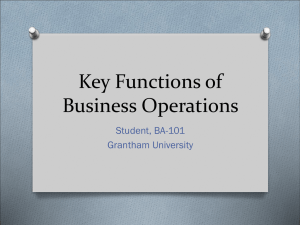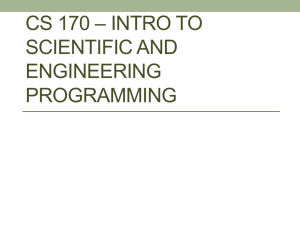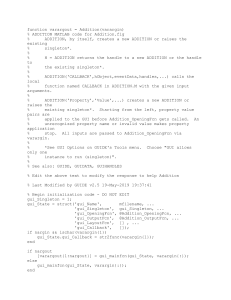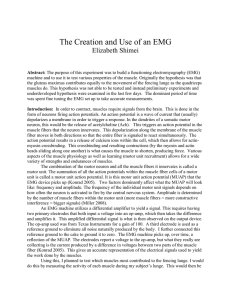無投影片標題
advertisement
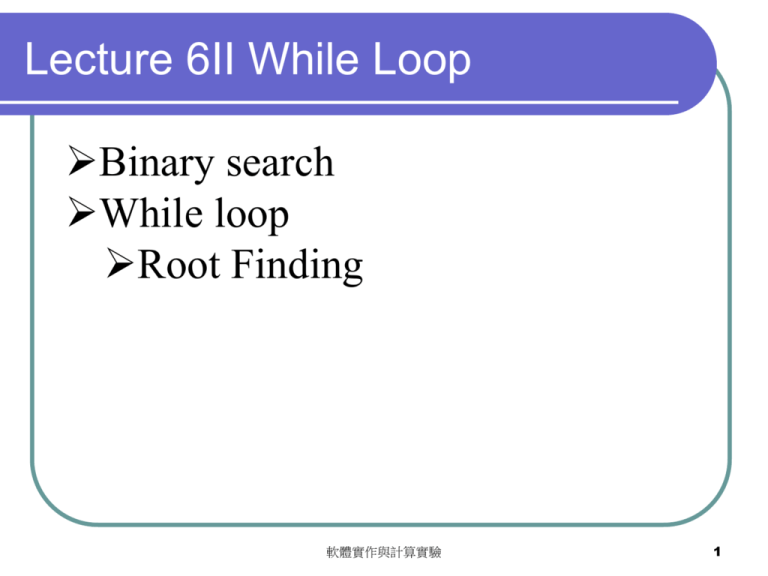
Lecture 6II While Loop
Binary search
While loop
Root Finding
軟體實作與計算實驗
1
An array of sorted integers
X is an array of n sorted integers
X[i] < X[j], if i < j
X=[1 3 5 7 9 11 13 15 17]
e.x. X[3] = 5 < X[6] =11
軟體實作與計算實驗
2
Searching
Check whether integer s belongs X or
not
Sequential search: Compare s with
X[1],X[2],…,X[n] one by one
軟體實作與計算實驗
3
Input s,x
n = length(x)
i=1;
while X[i] < s
X[i] == s
i=i+1;
Y
fprintf(‘s in X’) fprintf(‘s not in X’)
軟體實作與計算實驗
4
For large n, it is time expensive to
compare s with elements in X one by
one
Binary search can improve this drawback
Binary search is more efficient than
sequential search
軟體實作與計算實驗
5
An array of sorted elements
X is a vector of positive integers
X[i] < X[j] if i < j
Input s
Output i
i > 0, where x[i] == s
i=0, when s ~= x[i] for all i
軟體實作與計算實驗
6
Example
X=[1 3 5 7 9 11 13 15 17] and s=5
Output : 3
軟體實作與計算實驗
7
Example
X=[1 3 5 7 9 11 13 15 17] and s=4
Output : 0
軟體實作與計算實驗
8
An array of sorted natural numbers
N=10;
X=ceil(rand(1,N)*10000);
X=sort(X)
X=
Columns 1 through 7
1704
1834
2141
2633
6022
6050
6366
Columns 8 through 10
6596
6597
7537
軟體實作與計算實驗
9
N=500;
X=ceil(rand(1,N)*10000);
X=sort(X)
a=1;b=length(X);
軟體實作與計算實驗
10
Binary search cuts [a,b] into two subinterval
[a, c - 1] {c} [c 1, b]
Where c=floor((a+b)/2)
軟體實作與計算實驗
11
Three possible cases
Case I
Case II
If s < X[c], the answer should belong [a,c-1]
Case III
If s == X[c], halt
If X[c] < s, the answer should belong [c+1,b]
Two operations
Case II:
Case III:
b c -1
a c 1
軟體實作與計算實驗
12
Example for case II
X=[1 3 5 7 9 11 13 15 17] and s=4
a=1; b=9
c= 5
The location of s is within [a,c]
By operation, b c -1
the searching range [a b] is [1 4]
軟體實作與計算實驗
13
Example for case III
X=[1 3 5 7 9 11 13 15 17] and s=13
a=1; b=9
c= 5
The location of s is within [c,b]
By operation a c 1
the searching range [a b] is [6 9]
軟體實作與計算實驗
14
Example
X=[1 23 45 38 66 77 88 99 101 999] and
s=66
a=1; b=5
c= 3
The location of s is within [c,b]
By operation a c
the searching range [a b] is [3 5]
軟體實作與計算實驗
15
Input s,x
b = length(x)
a =1;
c=floor((a+b)/2)
while ~(a>b |X(c) == s)
s < X(c)
T
b=c-1
a=c+1
c=floor((a+b)/2)
軟體實作與計算實驗
16
Entry condition
~(a>b | X(c) == s)
Halting condition
(a>b | X(c) == s)
軟體實作與計算實驗
17
Inline : f(x) = sin(x)
fs = input('f(x) = ','s');
f = inline(fs);
>> f(pi/2)
ans =
1
軟體實作與計算實驗
18
Roots
Mathematics
x is a root of f(x) if f(x) = 0
Numerical analysis
x is a root of f(x) if abs(f(x)) < eps
>> sin(pi)
>> abs(sin(pi)) < eps
ans =
ans =
1.2246e-016
1
軟體實作與計算實驗
19
Existence of roots
f(x) is well defined over interval [a,b]
If f(x) is continuous and f(a)f(b) < 0
there exists at least one root within [a,b]
f(b)
a
b
f(a)
軟體實作與計算實驗
20
Bipartition
Partition interval [a,b] to two intervals
such that [a,b]=[a,c] U [c,b],
where c = (a+b) / 2
a
c = (a+b)/2
軟體實作與計算實驗
b
21
Proposition
If f(a)f(b) < 0
it holds that f(a)f(c) < 0 or f(c)f(b) < 0
a
c = (a+b)/2
軟體實作與計算實驗
b
22
Proof
f(a)f(b) < 0, f(c) ≠ 0
(I) f(a) > 0 and f(b) < 0
f(c)f(a) < 0 or f(c)f(b) < 0
(II) f(a) < 0 and f(b) > 0
f(c)f(a) < 0 or f(c)f(b) < 0
軟體實作與計算實驗
23
Target interval
If f(a)f(b) < 0
it holds that f(a)f(c) < 0 or f(c)f(b) < 0
If f(a)f(c) < 0, choose [a c] as target interval
If f(c)f(b) < 0, choose [c b] as target interval
a
c = (a+b)/2
軟體實作與計算實驗
b
24
Binary search
Target interval [t1 t2]
If halting condition holds, halt
a ← t1, b ← t2, c ← (t1+t2)/2
If f(a)f(c) < 0, t1 ← a, t2 ← c choose [a c]
If f(c)f(b) < 0, t1 ← c, t2 ← b choose [c b]
軟體實作與計算實驗
25
Halting condition
c=(t1+t2)/2
f(c) is close enough to zero
Implementation
abs(f(c)) < eps
軟體實作與計算實驗
26
Zero finding
Flow Chart:
Input t1,t2,f
c=(t1+t2)/2
abs(f(c)) > eps
T
a=t1;b=t2;c=(a+b)/2
if f(a)*f(c) < 0
t1=a;t2=c;
else
t1=c;t2=b;
end
c=(t1+t2)/2;
軟體實作與計算實驗
Return c
27
my_fzero.m
軟體實作與計算實驗
28
New
軟體實作與計算實驗
29
Edit Text
軟體實作與計算實驗
30
Addition
軟體實作與計算實驗
31
軟體實作與計算實驗
32
軟體實作與計算實驗
33
function pushbutton1_Callback(hObject, eventdata, handles)
% hObject handle to pushbutton1 (see GCBO)
% eventdata reserved - to be defined in a future version of MATLAB
% handles structure with handles and user data (see GUIDATA)
s1=get(handles.edit1,'String');
s2=get(handles.edit2,'String');
x=str2double(s1)+str2double(s2);
s3=num2str(x);
set(handles.edit3,'String',s3);
return
軟體實作與計算實驗
34
軟體實作與計算實驗
35
GUI tool
Add.fig
Add.m
軟體實作與計算實驗
36
ADD16
A toolbox for addition of hexadecimal numbers
軟體實作與計算實驗
37
軟體實作與計算實驗
38
Symbolic integration
A toolbox for demonstrating symbolic
integration
軟體實作與計算實驗
39
軟體實作與計算實驗
40
Matlab Application Platform
Web server
Stand-alone execution
Mobile connection
Matlab C++ or C mobile app
軟體實作與計算實驗
41
Exercise #a#b
Generate four distinct characters within
{’0’, ’1’, ’2’, ’3’, ’4’, ’5’,’6’,’7’,’8’,’9’} randomly
Draw a while-loop to realize the game of
#a#b
Allow a player to key-in a four-digit string
Print na’a’nb’b’ in response to the given string
Halt if the guess is scored as 4’a’
軟體實作與計算實驗
42
na denotes the number of guessed
characters that appear at right position in
the target
nb denotes the number of guessed
characters that appear at wrong position in
the target
軟體實作與計算實驗
43
Example
Target : 6481
Guess : 1628
Guess : 1946
Guess : 6283
Guess : 6481
Output:
Output:
Output:
Output:
軟體實作與計算實驗
0a3b
0a3b
1a1b
4a0b
44
Draw a flow chart to illustrate how to
determine na for given target and guess
Draw a flow chart to illustrate how to
determine nb for given target and guess
軟體實作與計算實驗
45
Write MATLAB functions to implement
flow charts for #a#b
軟體實作與計算實驗
46
Characters & integers
tt = randperm(10)-1
cc=input('keyin:', 's');
tt(1) == cc(1)
tt(1) == cc(1) - '0'
軟體實作與計算實驗
47
